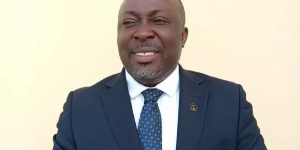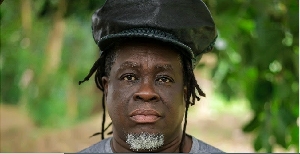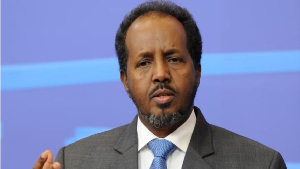By Kwame Okoampa-Ahoofe, Jr., Ph.D.
Unbeknownst to me, my article commenting on the February 1990 prison release of Nelson Mandela had created quite a stir among the predominantly White-American faculty and staff of City College. In the main, I had stated, in hindsight rather hyperbolically, that I felt uncontrollably murderous about the entire affair, because it wickedly appeared as if the powerful Boer cabal of the Apartheid regime was playing games with the emotions of the global African community, the very way and manner that a toddler toyed with the bathroom or kitchen faucet while a parent's attention was diverted and engrossed elsewhere.
A few weeks before The Madiba's release, his older friend and sometime academic sponsor and African National Congress (ANC) comrade, Mr. Walter Sisulu, had been let out of the same prison where Mr. Mandela continued to be held; and the former's release had sparked quite a remarkable flame of excitement both within and without the geopolitical confines of South Africa. The Madiba had sent his warmest greetings, per Mr. Sisulu, to the great people of South Africa of all races and creeds, as well as the supporters and sympathizers of the ANC around the globe.
Walter Sisulu's release had sparked a bonfire of excitement because it seemed to presage the imminent release of the most famous of all the incarcerated freedom fighters. Several times in the recent past, we had been informed by President DeKlerk's predecessors that The Madiba had either flatly and/or roundly refused to walk out of the Stygian mess that was the Pollsmoor Maximum-Security Prison into the resplendent sunshine of the climatically temperate South African firmaments, on the unarguably rational grounds that he would not, under any circumstances, whatsoever, be bound by any morally and functionally stultifying conditions that entailed the unreserved promise of non-violent good behavior. For The Madiba, the only condition under which he could be voluntarily guaranteed to walk out of the Pollsmoor prison walls would be for the DeKlerk regime to lay out a definitive and temporally specific agenda for the implementation of a democratic electoral system based on the universally accepted suffrage regime of one person, one vote.
A righteously adamant refusal to accept any political arrangement short of one with the foregoing hallmarks was clearly what had prolonged the release of The Madiba. After nearly three decades in the slammer, under intermittent bouts of the most horrible of circumstances under which to lock down any political prisoner, Mr. Mandela was not about to facilely abdicate his birthright for terms so abjectly demeaning and dehumanizing all at once.
Anyway, on the morning of the publication of my article both welcoming as well as congratulating The Madiba, for so boldly and courageously standing his ground and up to the NATO-backed white supremacist and apartheid regime, one of my African-American professors, Dr. James DeJongh, whom I very much respected, beckoned me into his office for a brief but quite significant chat. Dr. DeJongh was my Critical-Thinking course professor and had been born and raised in the United States' Virgin Islands, where his father had served as Finance Minister. He was easily among my best-educated professors, having attended the Worcester, Massachusetts-based College of the Holy Cross and Yale University for his graduate studies. His father was of Asian origin and ethnic Chinese descent, while his mother was a Black woman of West African provenance. And his demeanor, complexion and physical and facial features reflected such racial admixture in a strikingly felicitous manner, once he regaled the listener with his natal narrative.
I had taken a two-semester, two-course sequence with Dr. DeJongh amounting to six academic credits, and before that a three-credit bearing course in playwriting. It was during the course of the latter course that I learned to my surprised amusement that a word which I had casually and almost innocently written into one of my one-act play manuscripts meant something totally different in my newly adopted American cultural milieu. That word was "faggot." I had used it in its original rural aboreal sense of "tinder," twigs of firewood routinely used as culinary fuel back in my native Ghana.
"Take a seat and make yourself comfortable," Dr. DeJongh said as he pointed to one of two cushioned chairs facing him across his huge metallic desk.
"Are you contemplating on killing some white folks on this campus?" he asked with an inflected tinge of concern in his pastel-soft Caribbean accent.
"Any problem, sir? Absolutely not! Why?" I responded with a shrug of my shoulders with a show of nearly equal concern.
Dr. DeJongh held up a copy of The Campus newspaper edition which carried my Mandela article and calmly informed me that it had become quite a hot topic of discussion that Monday or Tuesday morning, and that he just wanted to draw my attention to the quite remarkable anxiety that it had created among some of the heavy-lifters on campus. The unspoken but glaringly obvious subtext appeared to have been a casual psychological probe to make sure that I wasn't, somehow, a powder keg waiting to explode in the offing.
Dr. DeJongh seemed remarkably a bit more relaxed and genially admonished me to be very careful with whatever I committed to print from then on. I thanked him for his avuncular concern, bundled up my book bag and sprinted out of his office. I was about 10 minutes late for my next class. I cursed no one in particular under my breath and headed for my American Literature honors class up the hallway. The instructor for that course was Dr. Earl Rovit, a gracefully aging lambent-witted scholar and authority on Southern (United States) Literature and a longtime editorial board member of the prestigious Mississippi Review.
Perhaps if I had drawn closer to the banks of the creek, as the old maxim goes, I would have realized to my delightful surprise that the crab can also cough. Today, Dr. DeJongh - we students, among ourselves, affectionately called him "Jim Dee" - is recently retired from teaching English at CCNY of CUNY and from directing the doctoral program at the Graduate Center of the City University of New York. Once or twice when he have met in the oval, or the sprawling compound, of the cooperative apartment complex in which we both live as shareholder-neighbors and residents, Jim Dee has suggested to me to send in my resume for possible hiring as his successor to run the CUNY doctoral program in Africana studies. Several of his colleagues have gone the way of all mortals; and those who, like Jim Dee, are still carrying on have gotten tired and retired.
I have invariably expressed to him my gratitude but tersely responded that moving from a tenured and relatively more secure professorial track, to admittedly a more prestigious but an untenured track does not tempt me nearly greatly enough, especially in these occupationally lean times. We are still good neighbors, though, although I haven't seen the man on the oval for quite awhile now.
___________________________________________________________
*Kwame Okoampa-Ahoofe, Jr., Ph.D.
Department of English
Nassau Community College of SUNY
Garden City, New York
Dec. 8, 2013
E-mail: okoampaahoofe@optimum.net
###
Opinions of Wednesday, 11 December 2013
Columnist: Okoampa-Ahoofe, Kwame














